Sat., Apr. 10, 1943—Some more of the Sqdn. and I moved up to Thelepte again, for first time since Feb. 15th. Pitched Ops. tent. Slept with Dave in Armament tent. Will dig a home tomorrow.
Sun., Apr. 11, 1943—Dug foxhole by Ops. tent. Worked all day typing mission and enemy action reports. Saw Jr. for a few minutes this evening.
Mon., Apr. 12, 1943—Dentist 3:30—couldn’t keep appointment because I had moved (from Canrobert to Thelepte). Had three alerts today but no raids.
| Donald J. Tolle, 1988: Another thing that impressed me when I read my diary in its entirety was how many teeth I had filled while overseas. At Canrobert I had the interesting experience of going to an American field dentist who set up his tents just across the road from our camp. The dental drills were powered by an enlisted man who simply worked his foot up and down on a treadle which mechanically turned the drill while the dental officer did his work on the teeth. Later, the Group apparently got a full-time dentist, who traveled about with the 47th Hq. (He was the same fellow who pulled a tooth of mine when I thought it was abscessed, then held it up and said, “There’s nothing the matter with this tooth!”) |
Tues., Apr. 13, 1943—Still sleeping in Armament tent with Dave.
Wed., Apr. 14, 1943—Lots of back work has been keeping me busy for several days.
Thurs., Apr. 15, 1943—Moving to Souk el Arba tomorrow morning early (30 miles from the front). Have seen Junior only once since I’ve been here this time.
Fri., Apr. 16, 1943—Found that Jr. had left for Souk el Arba 4 days ago. I left Thelepte in British truck packed with our officers and men. Arrived at Souk el Arba (1930) right after a bombing. Slept in open this p.m.
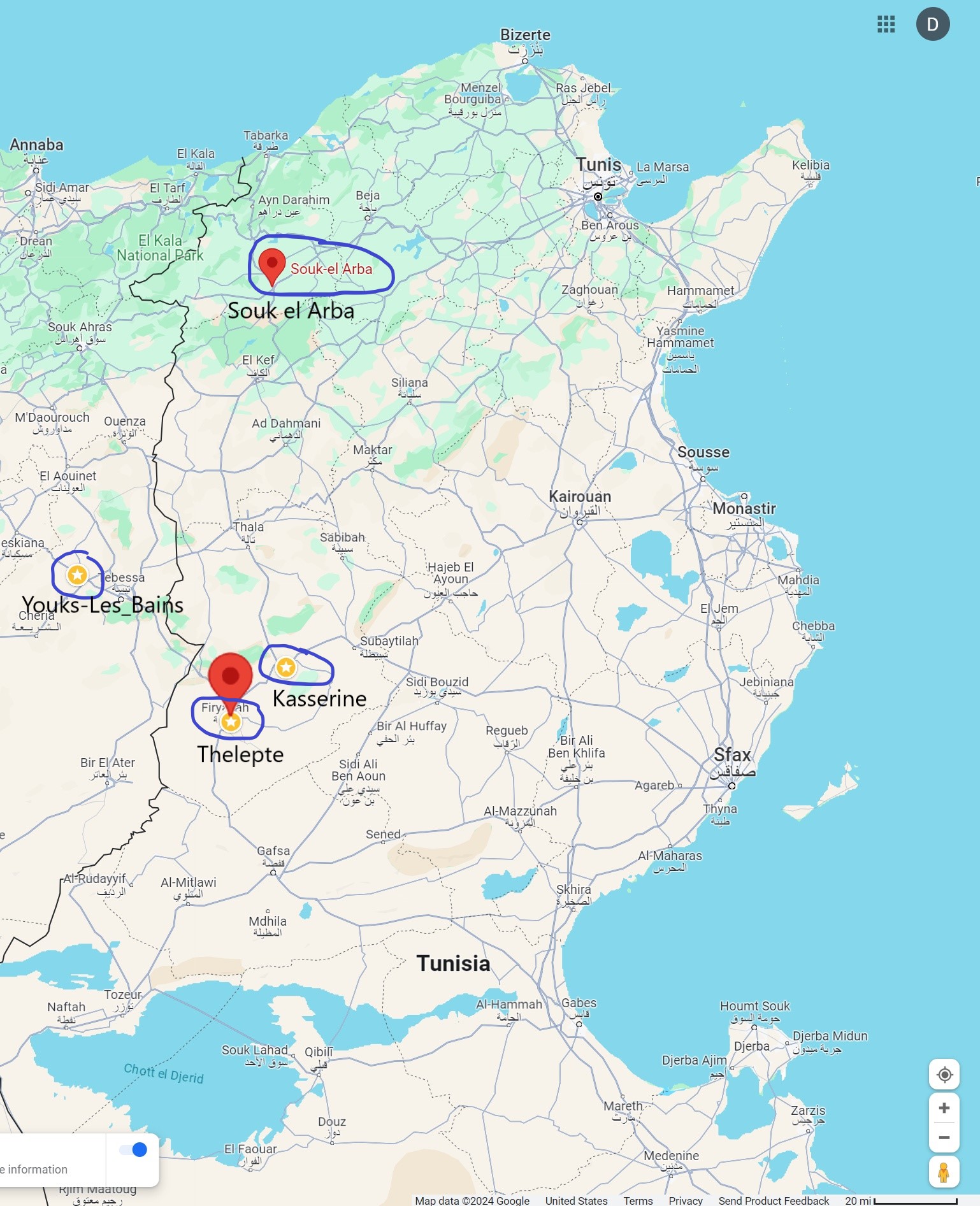
Sat., Apr. 17, 1943—Much warmer here—500 ft. above sea level. 30 or forty miles from enemy. Set up Operations. Got two letters from home. Couple of alerts. Enemy planes overhead tonight. Sky was alight with tracers and flak 3 times . . . Young, Chester, and I are sleeping in Ops. tent here at Souk el Arba. The weather these days reminds me of Florida.
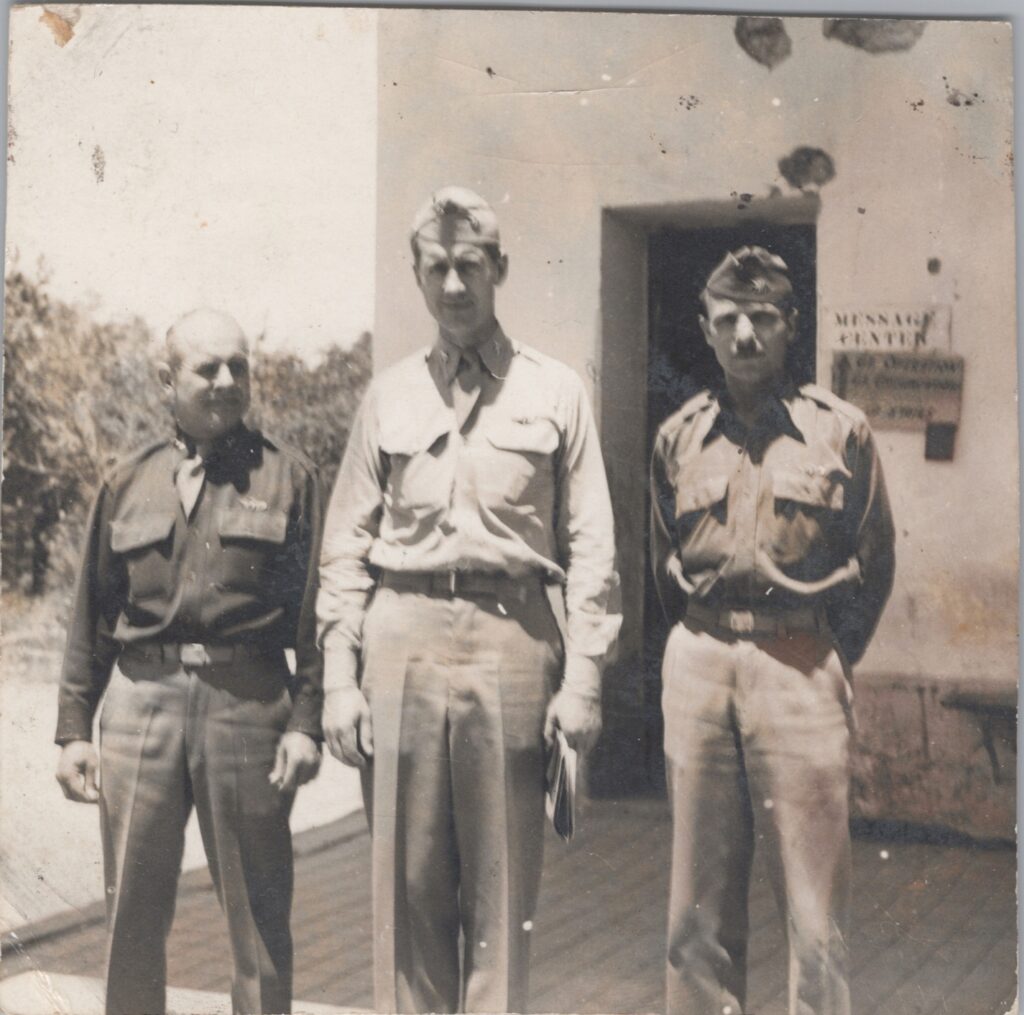
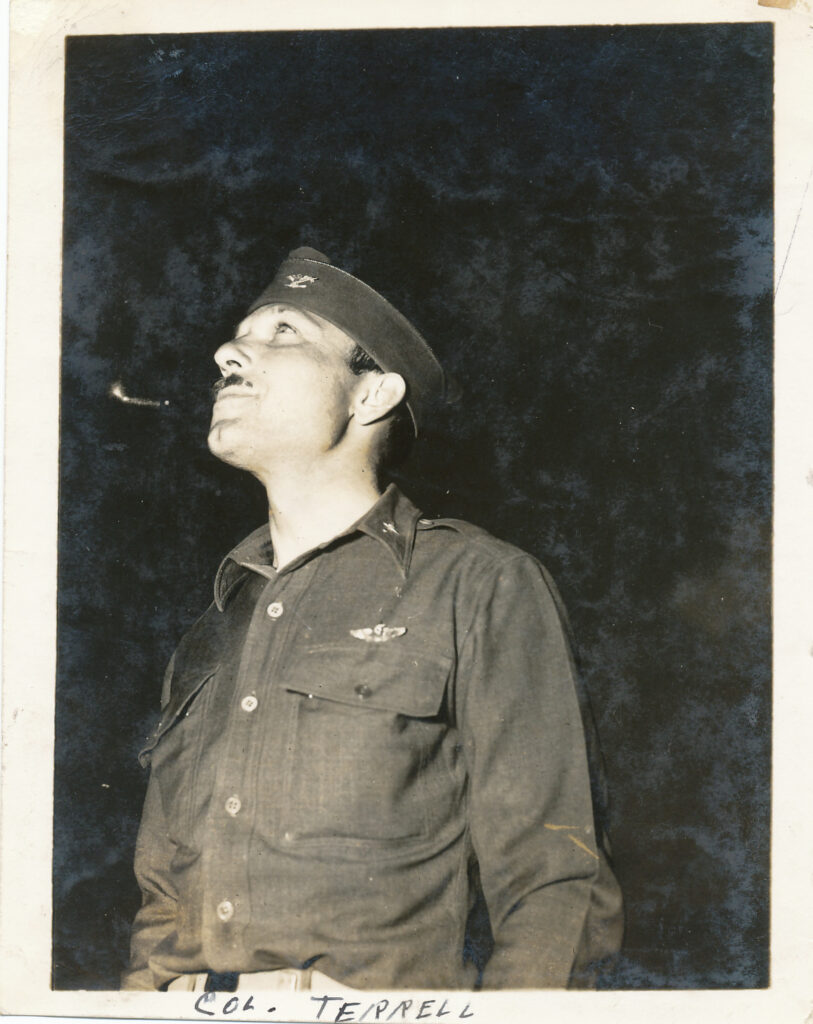
Sun., Apr. 18, 1943—Couple of alerts today. Bombs dropped on field next to ours. I’ve been doing lots of work since Klum was transferred out. Work about 12 hrs. a day usually.
Mon., Apr. 19, 1943—Two or three alerts today; no raids. Weather very warm here with nice, cool evenings.
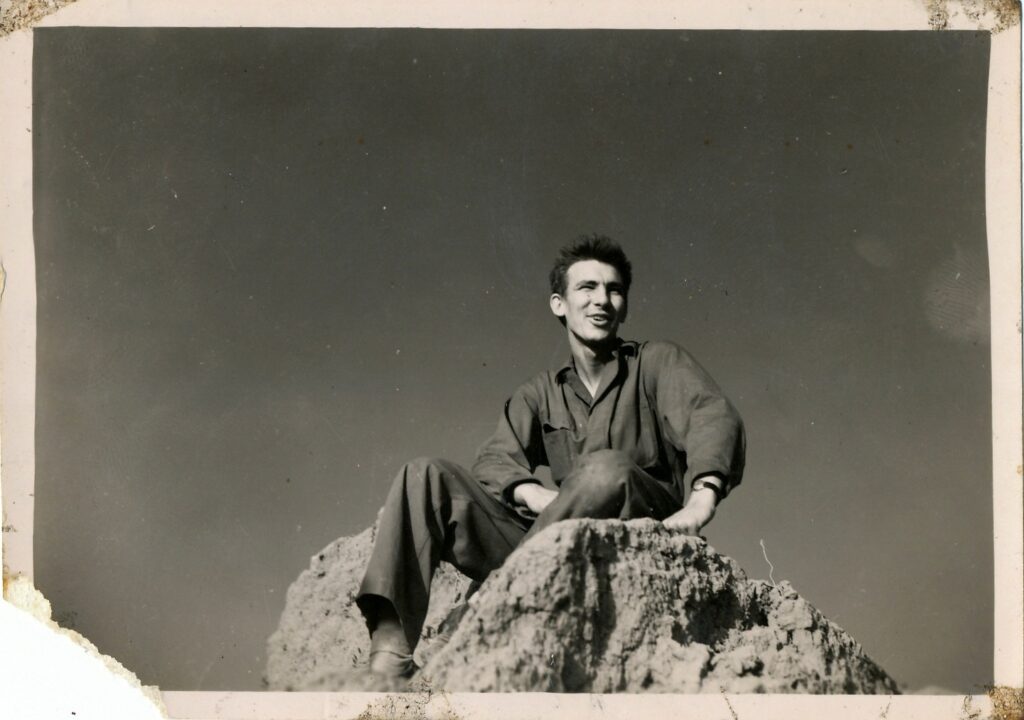
| Souk el Arba, Tunisia 4-19-43 Monday Evening in the Cool How lovely it is in the evening to sit— In the cool of the After-the-Sunset to sit, With your Love by your side—there to sit. How lovely it is to have nothing to do In the cool of the dusk when the long day is through But to sit with your Loved One—just sit, bill, and coo. (Oh, to have nothing to do but to sit, bill, and coo!) Such was the Time of the Time before this, In the cool of the night with my Sweet Little Miss There to sit, hold her hand, and to bill, coo, and kiss. (Oh, how lovely ’twill be in the Time after This ‘un Returning to billin’, to cooin’, and kissin’!) |
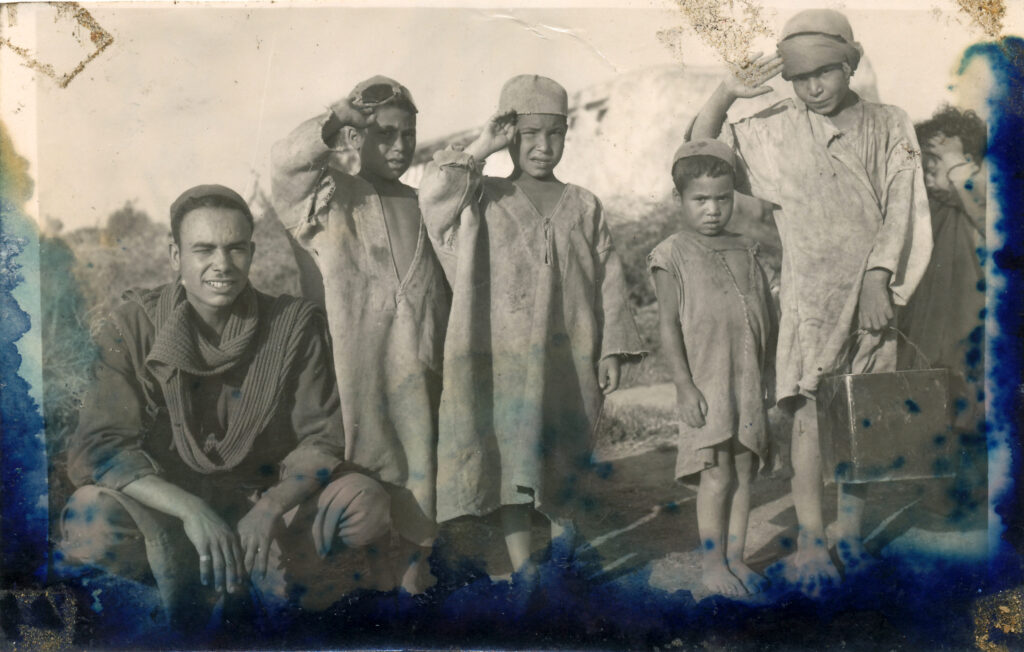
Tues., Apr. 20, 1943—Went into Souk el Arba to take a steam bath . . . Had a couple of alerts. No raids.
Wed., Apr. 21, 1943—Rain poured down. Sticky mud . . . Working as hard as I ever want to these days.
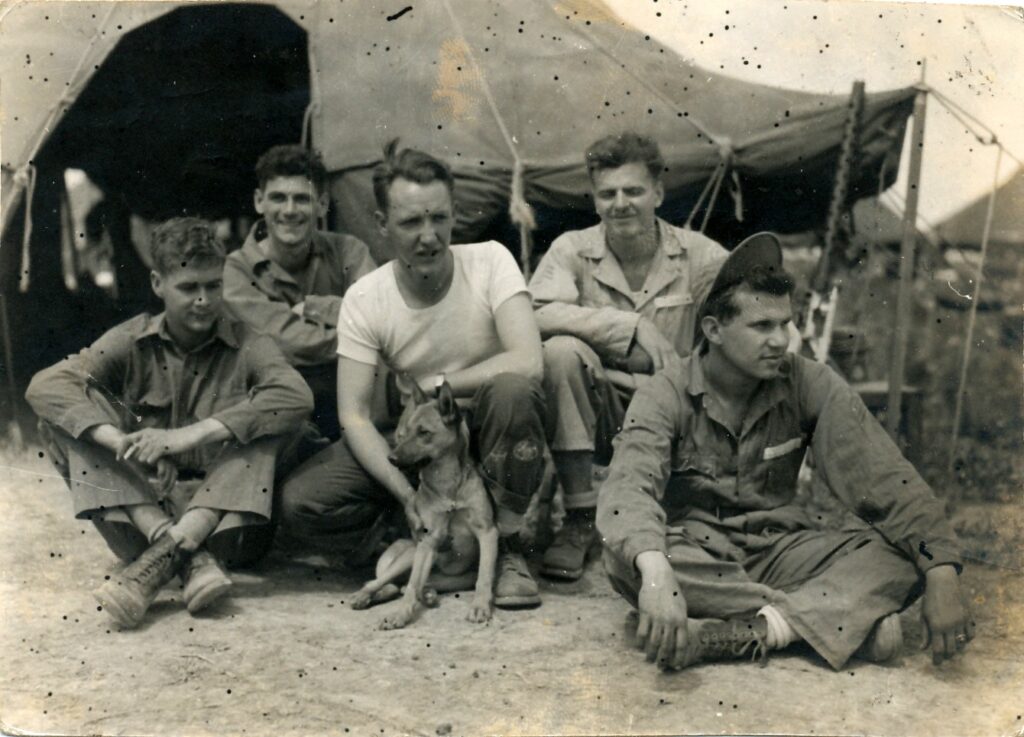
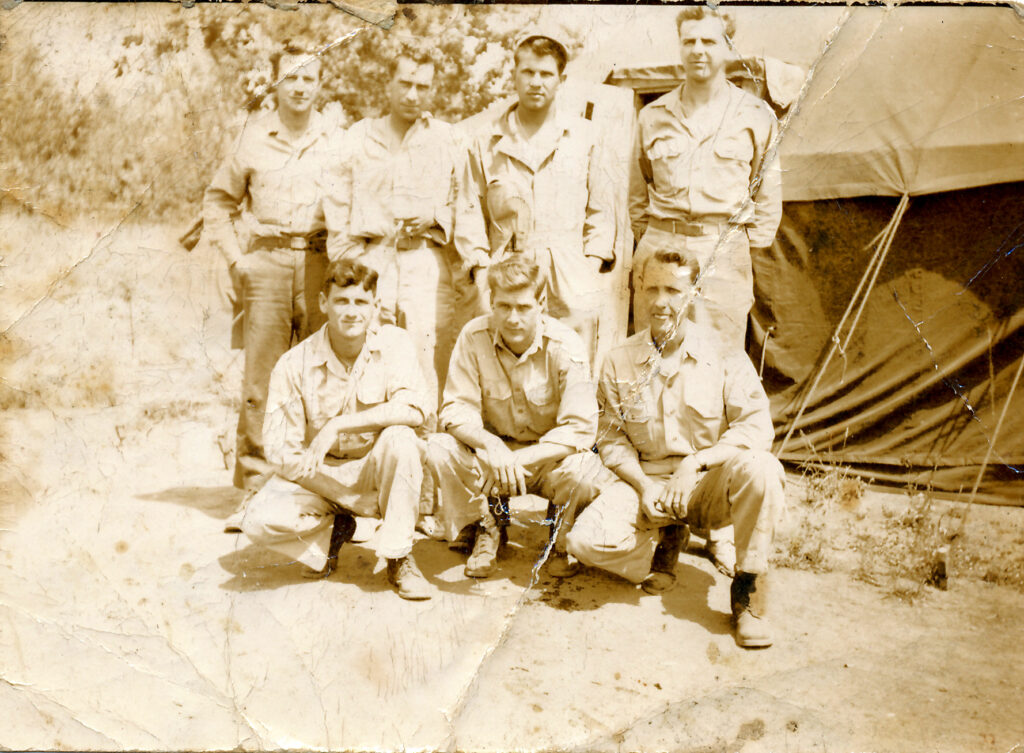
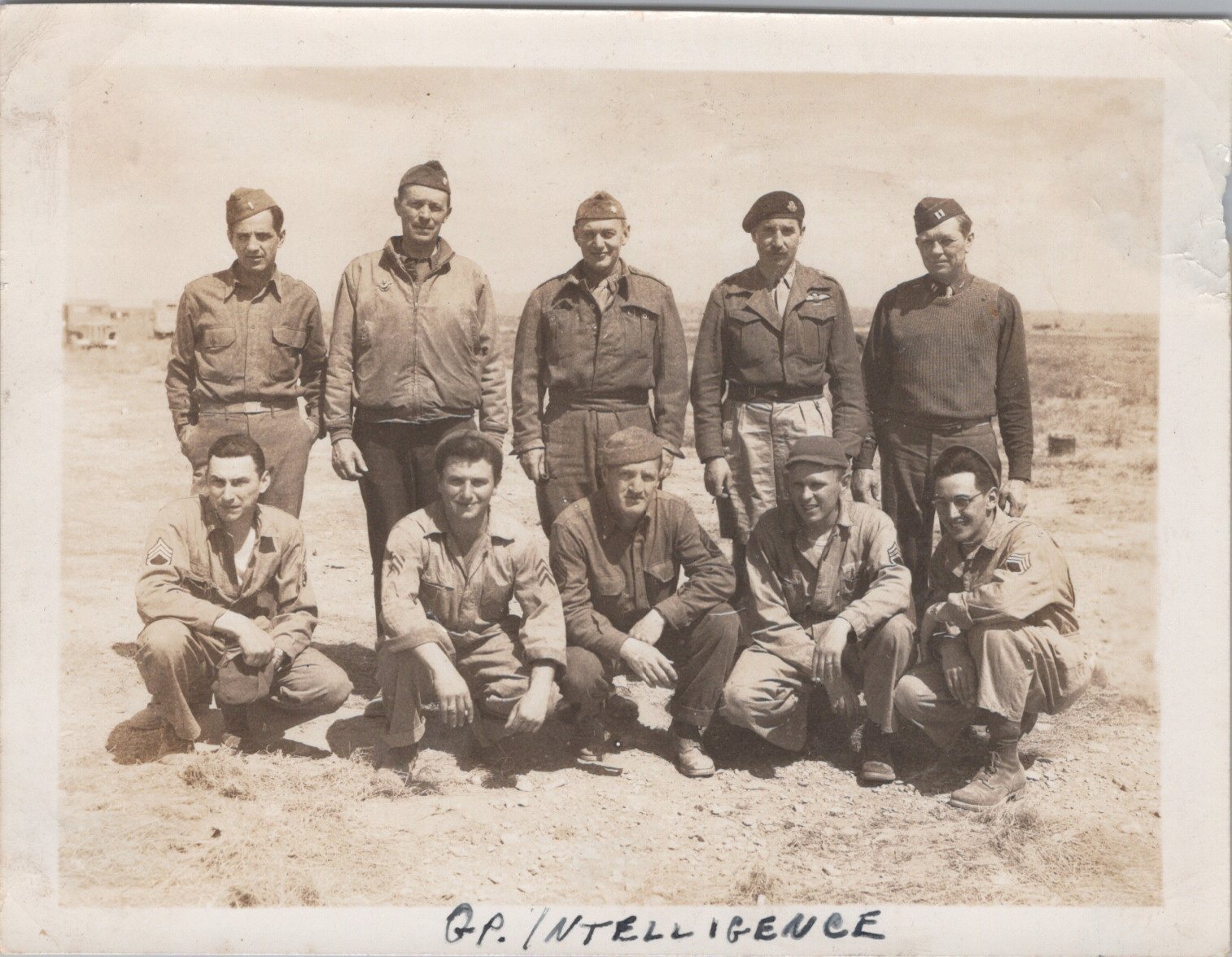
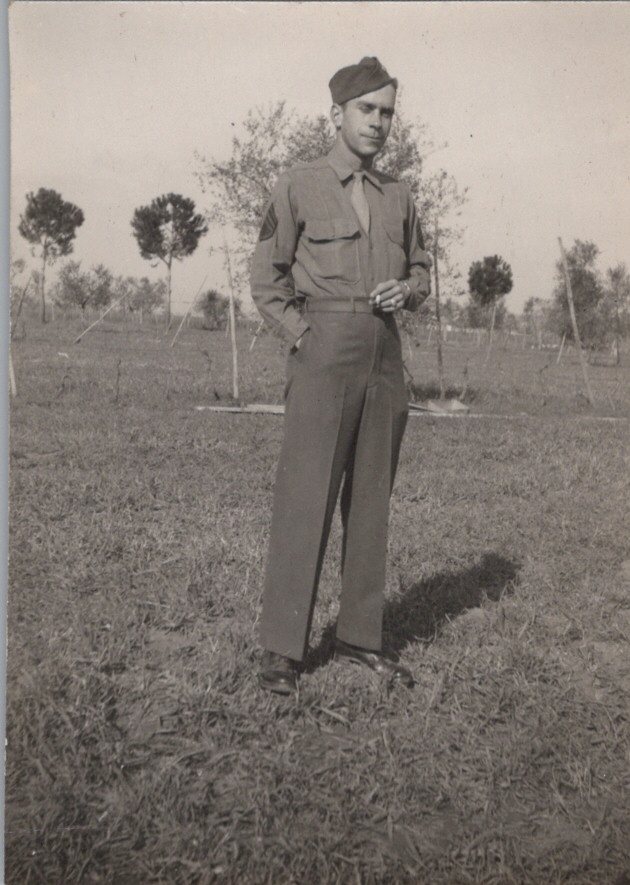
Thurs., Apr. 22, 1943—The big and final (we hope) push in Africa started last night. Lt. Gualtiere was shot down by flak today but crash-landed in friendly territory.
Fri., Apr. 23, 1943—A British officer, F/L D. G. Hatchard, was killed in Lt. Gualtiere’s crash-landing yesterday . . . Sgt. Limoges (RCAF) and Lt. Gualtiere were wounded by flak before the crash.
Sat., Apr. 24, 1943—Alerts; no raids today. Jerry must be “pooping out.”
| Souk el Arba, Tunisia 4-24-43 Variations on a Theme The sweetest smell is that of ground When Jerry spreads his bombs around. The man with nothing left but soul Is he who didn’t reach his hole When Jerry laid his eggs. The man whose bones have lost their dash Is he whose foxhole’s filled with trash. The sweetest scent I know is earth When Jerry’s bomb-bay doors give birth. Now some might think that I’m afraid, Just judging by the hole I’ve made. But really now, I’m not so fearful— Just, my Dear, exceeding ‘keerful’. |
Sun., Apr. 25, 1943—Easter Sunday; and I went on a bombing mission over enemy tanks & trucks. Rode in nose as “observer.” Couldn’t see much because half of nose was painted. They say there were enemy fighters and flak, but I couldn’t see them. Our bombs covered the target area. (Lt. Deaton, pilot; Haller & Easterling, gunners.)
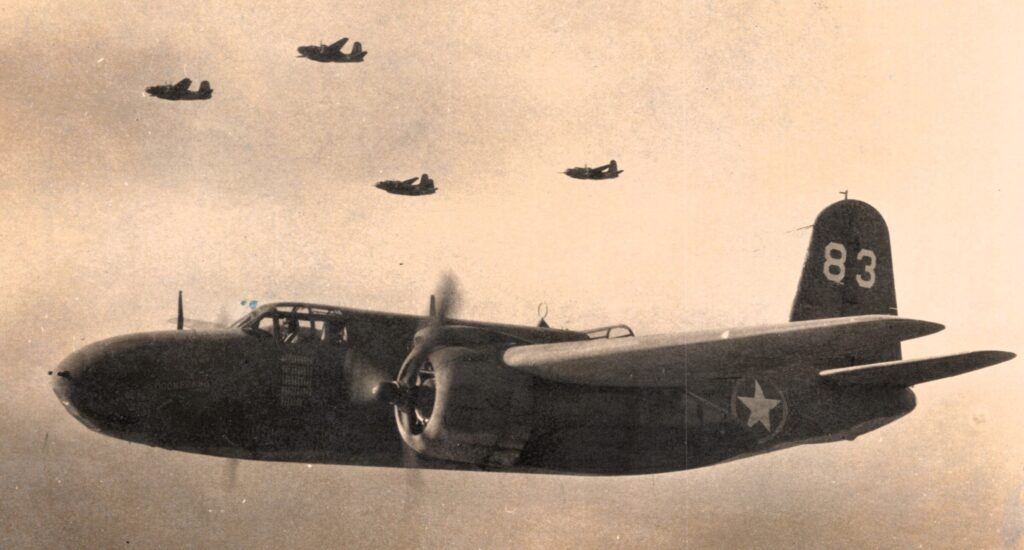
Mon., Apr. 26, 1943—Made a wooden bunk to get up out of the dust & bugs.
Tues., Apr. 27, 1943—Round-Boy Adams killed on mission today by a piece of flak. He was a swell kid. Everybody liked him . . . I was sick and vomited tonight.
Wed., Apr. 28, 1943—Our Sqdn. was the only one out of five to hit the target today. B-25’s accidentally bombed American troops.
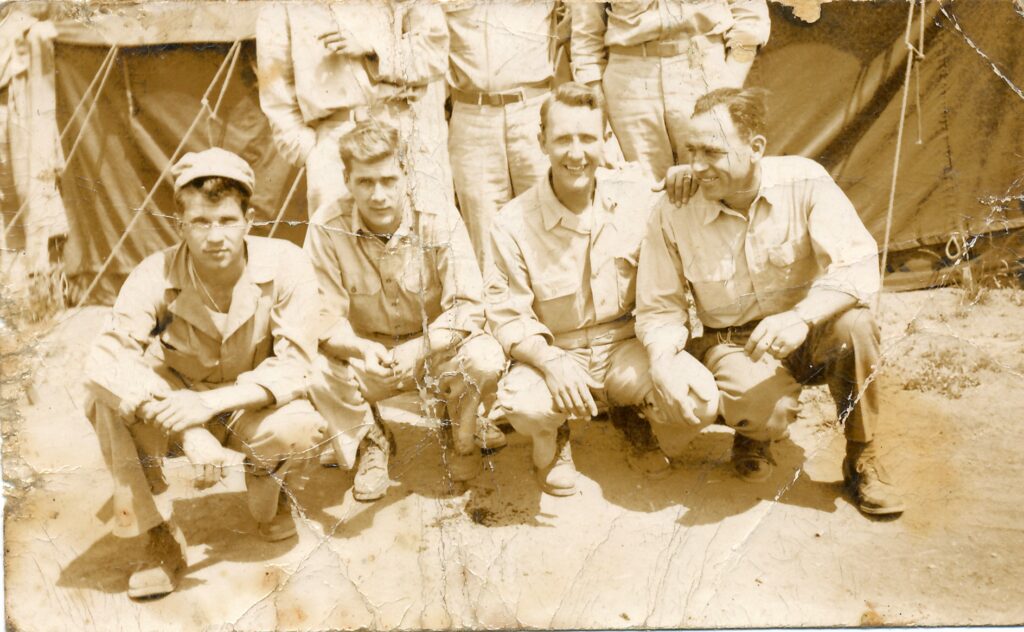
Thurs., Apr. 29, 1943—86th ship burning on the ground right now (14:00). Ammunition going off in all directions. Bombs will go off soon. Don’t know how fire started.
Fri., Apr. 30, 1943—Stood down for whole day (no operations). I caught up on some work and did some reading. Rain last night.
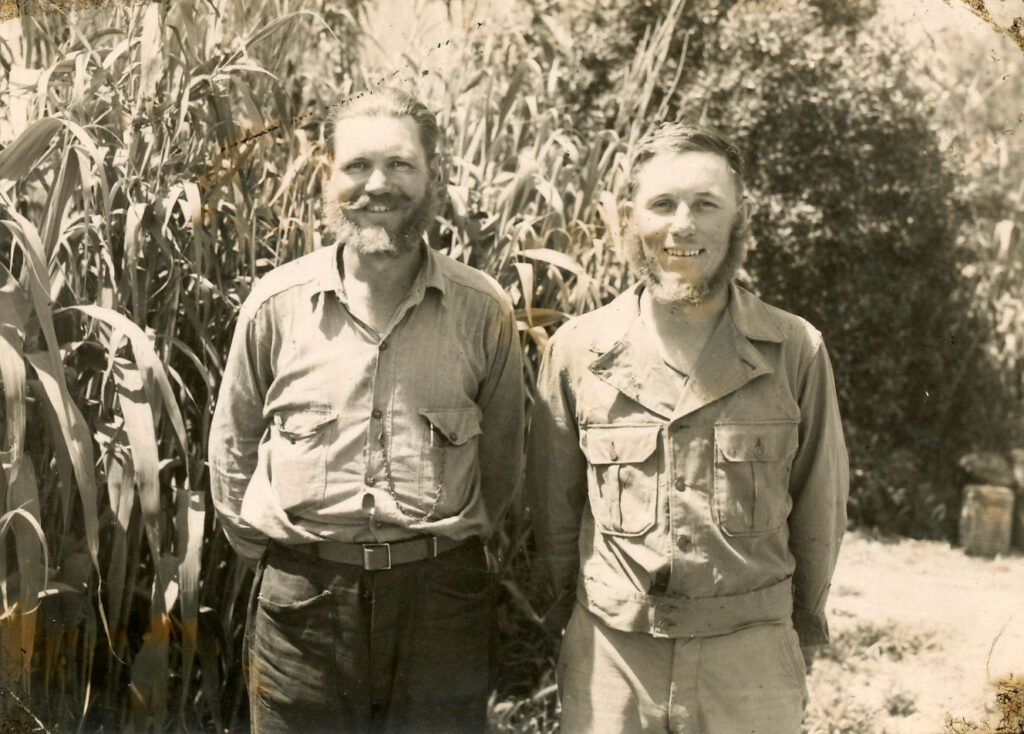
Sat., May 1, 1943—Stood down again today! Saw Burns Yates for first time since I left the States. Lightning, thunder, wind, and rain tonight.
Sun., May 2, 1943—Another busy day for me. Only one bombing mission today for Sqdn.
Mon., May 3, 1943—On guard tonight (graveyard shift); heard some bombs drop quite a distance off.
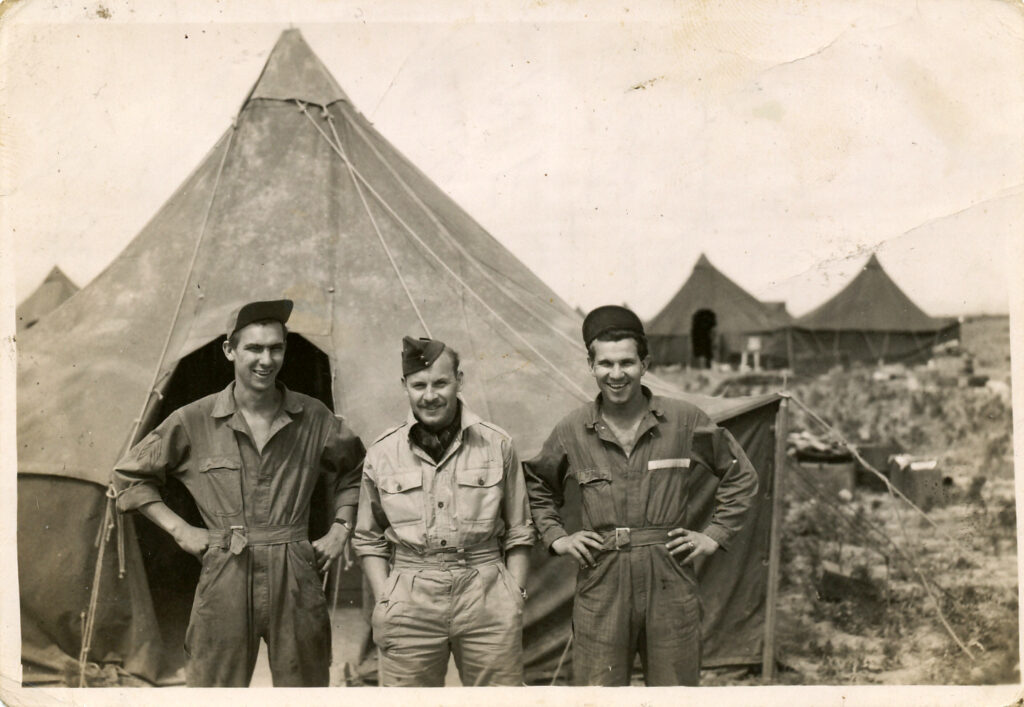
Tues., May 4, 1943—Going to see “Footlight Serenade” tonight (Betty Grable).
| Donald J. Tolle, 1988: In reading my diary straight through after getting it ready for the 1987 Long Beach reunion, I was impressed with how many movies were available to us (usually at night, in the open, with the side of a building serving as a movie screen), John Adair reminded me that at least once there was sniper fire at one of these outside showings. I had forgotten that and had not made any note of it, and I do not remember where or when this took place. |
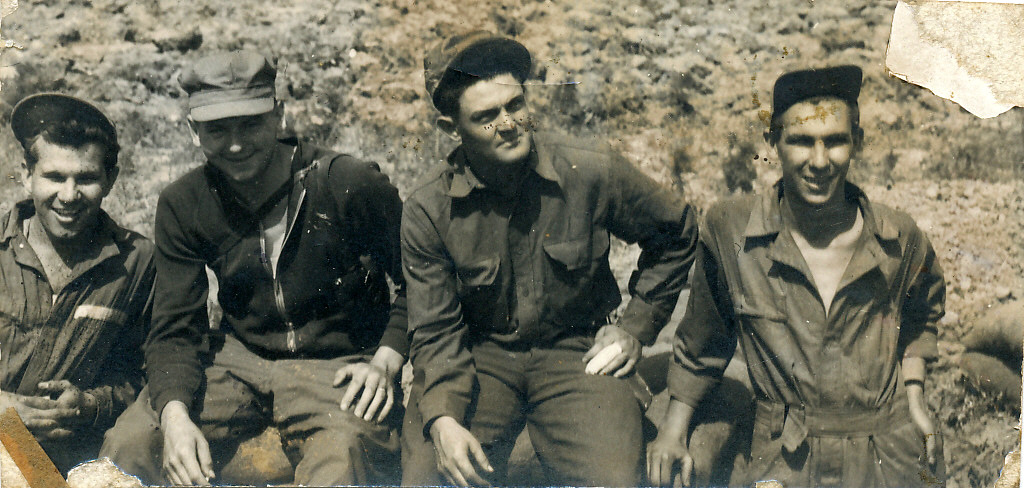
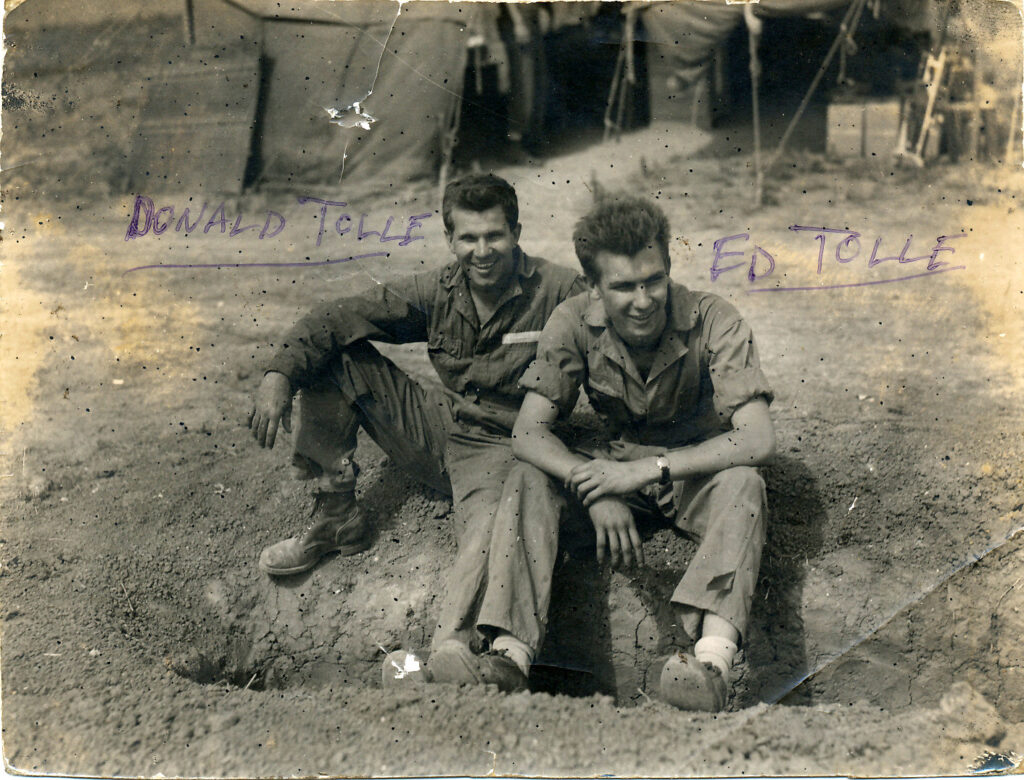
Wed., May 5, 1943—Three ammunition dumps blew up today and were going off spasmodically all afternoon. We hit the dirt several times as bombs and shells exploded. Heard one piece of shrapnel sing by the tent. (Sabotage was probable cause.)
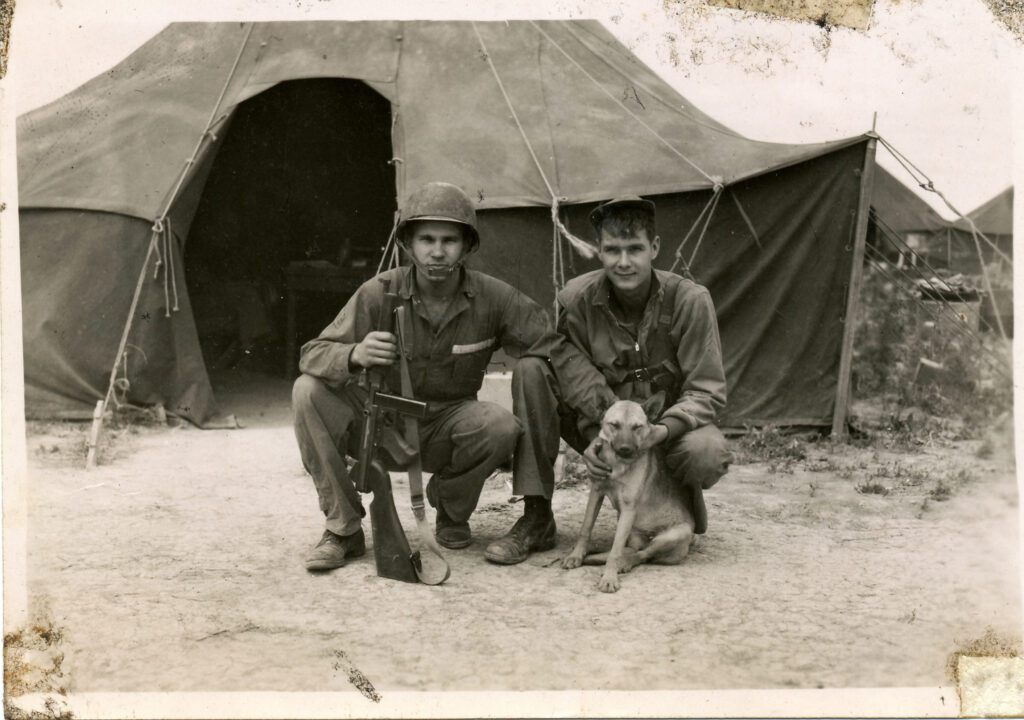
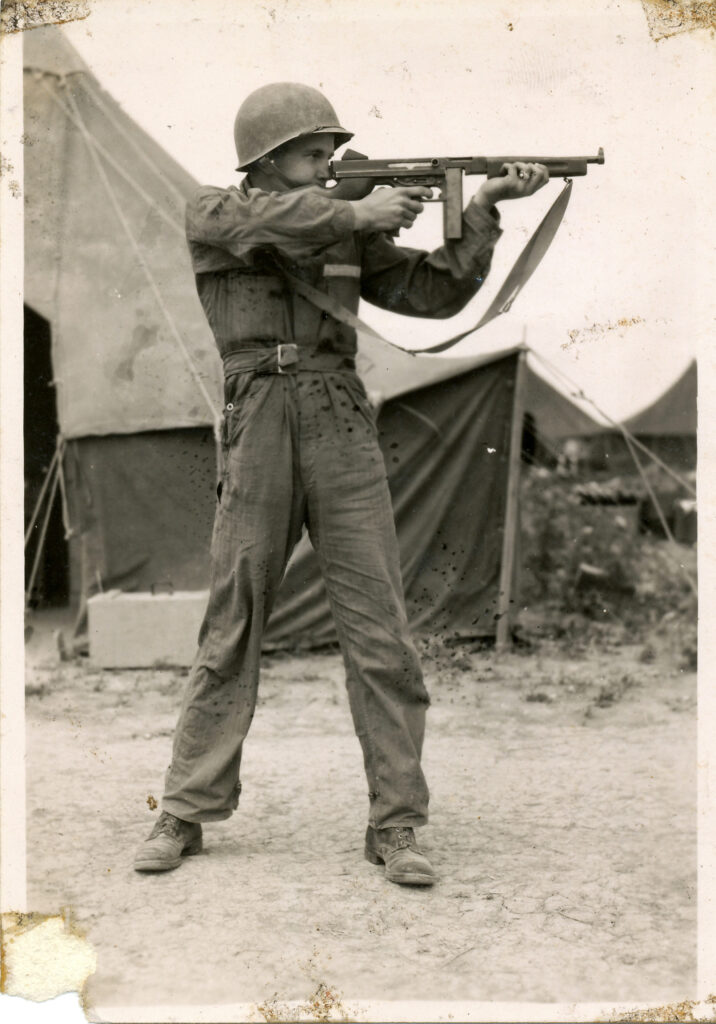
Thurs., May 6, 1943—Was up at 3:00 a.m. to get combat crews off on early mission, which started the last big drive for Africa. Three missions by Sqdn.
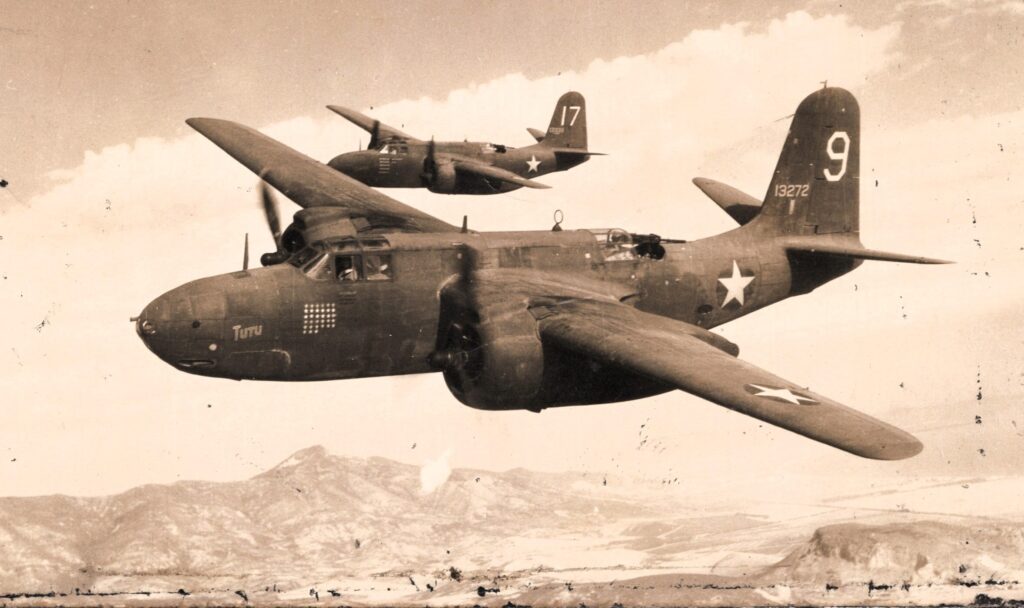
Fri., May 7, 1943—Letter from Mary Alice today.
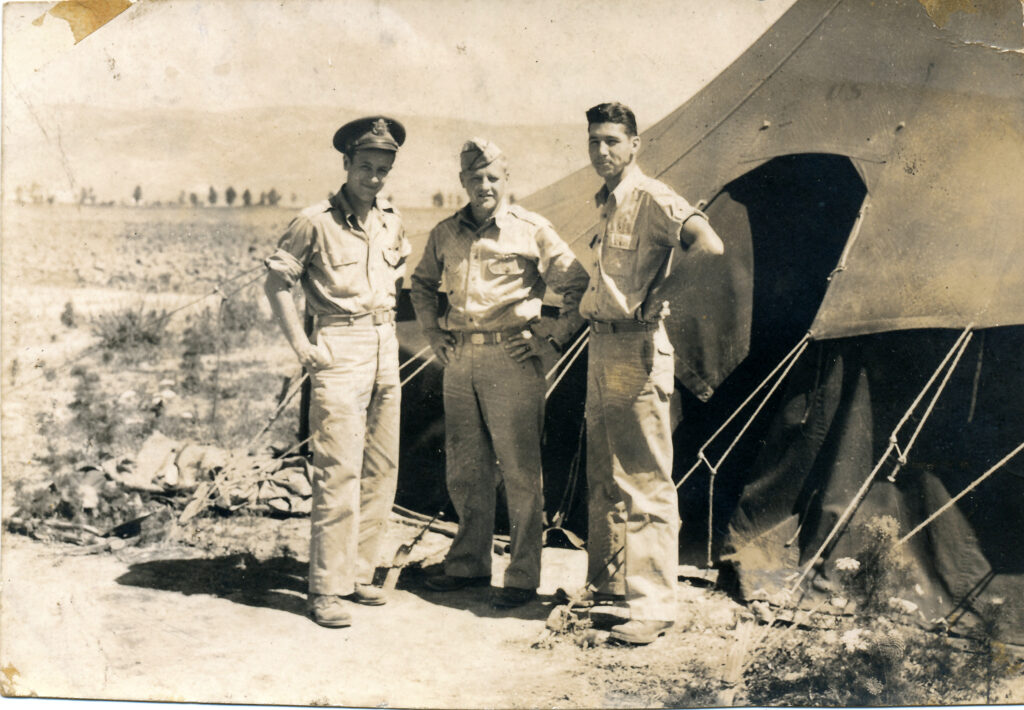
Artz was killed on a mission over Sicily on July 9, 1943.
Sat., May 8, 1943—Sqdn. ran 4 missions today. Germans are about finished in Africa—and I’m glad!
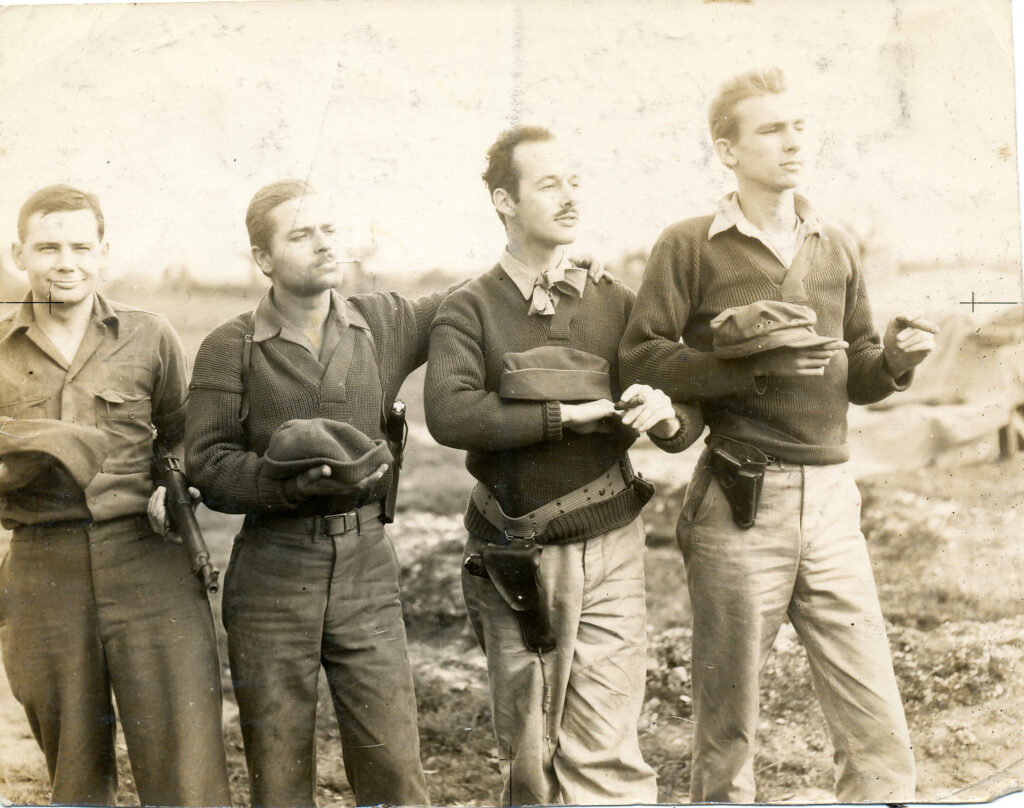
Sun., May 9, 1943—Mother’s Day. Many Germans surrendered in Tunisia today. It can’t be much longer. (30,000 surrendered.)
Mon., May 10, 1943—Train load of German prisoners went through Souk el Arba today. Hank Pollock talked to some of them.
Monday, May 10, 1943, Souk el Arba, Tunisia A train load of German prisoners came through town this morning. They were probably some of those which surrendered yesterday in the Bizerte area after one of our raids (30,000 of them surrendered). Hank Pollock, our mess sergeant, who speaks German, went down to the train and talked with them. This is the dialogue (roughly) which was carried on between Hank and some of the Nazis: German: “Where are we being taken?” Hank: “I don’t know—perhaps to Casablanca.” German: “You know that we hold Casablanca. You may beat us in Tunisia, but you’ll never drive us out of Constantine or Casablanca.” Hank: “Casablanca is where we started our drive in North Africa, and we’ve taken all of it from there to Tunis. I landed at Casablanca myself several months ago.” German: “American propaganda! Nothing but American propaganda! But do you think we’ll be taken to England or Canada?” Hank: “I don’t know. But why do you want to go to Canada?” German: “Because we’ll be safe there for the rest of the war.” Hank: “Well, wherever you go you’ll have to work.” German (showing his arm muscles): “That’s all right; we’ll work.” Hank: “What do you think of our airplanes?” German: “Oh, those Flying Fortresses (B-17’s) and Bostons (A-20’s) have done us terrible damage! Those Fortresses really carry a lot of bombs.” Hank: “What do you think about the war in Russia?” German: “The Russians will collapse in three months.” Hank: “The Allies will be in Berlin before the year’s out!” German: “You’re a jackass for even thinking such a thing!” Hank: “The Russians are pushing you farther back all the time.” German: “Nothing but some more American propaganda.” . . . and so on and on . . . . .(recorded from what Hank told me) |
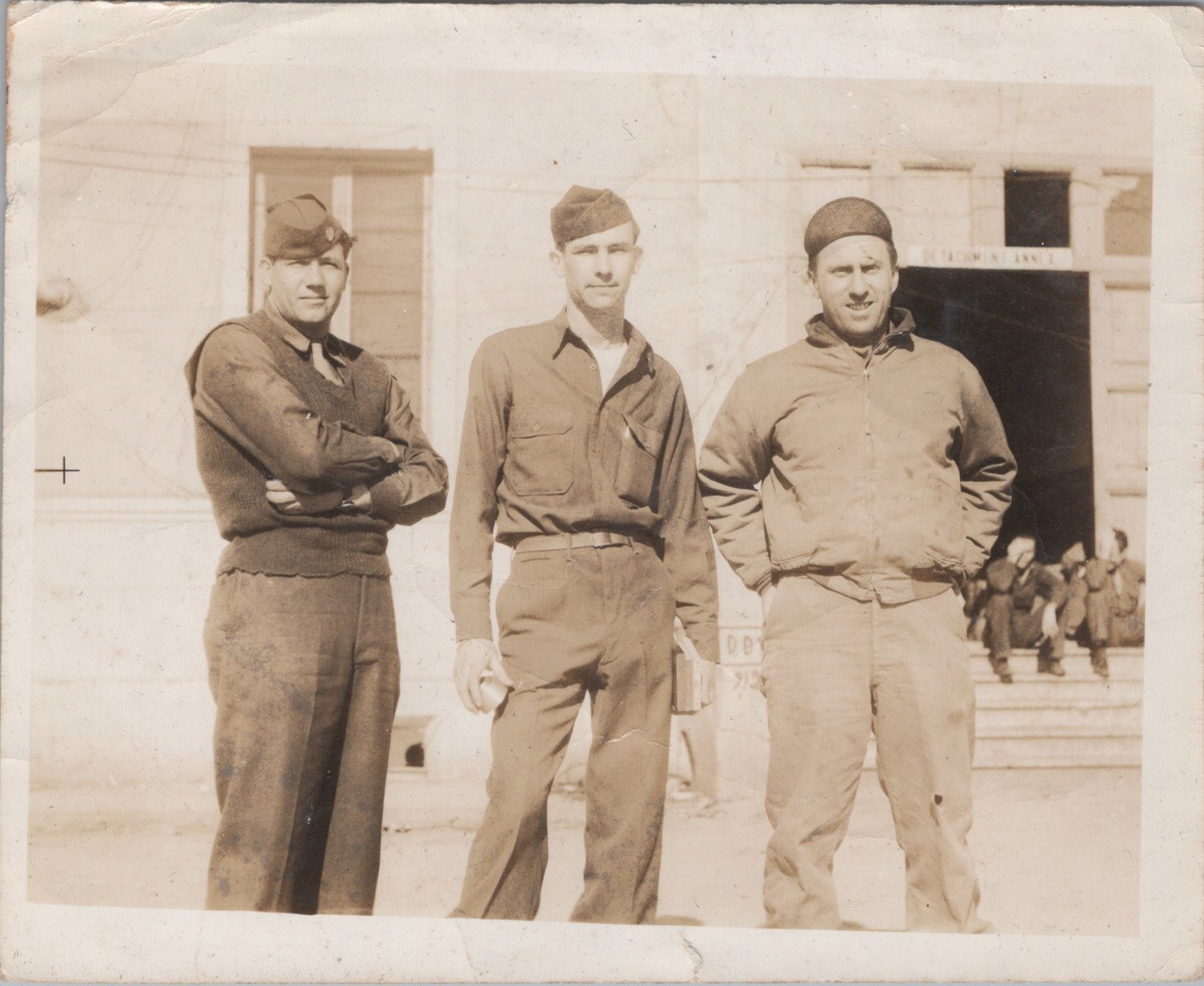
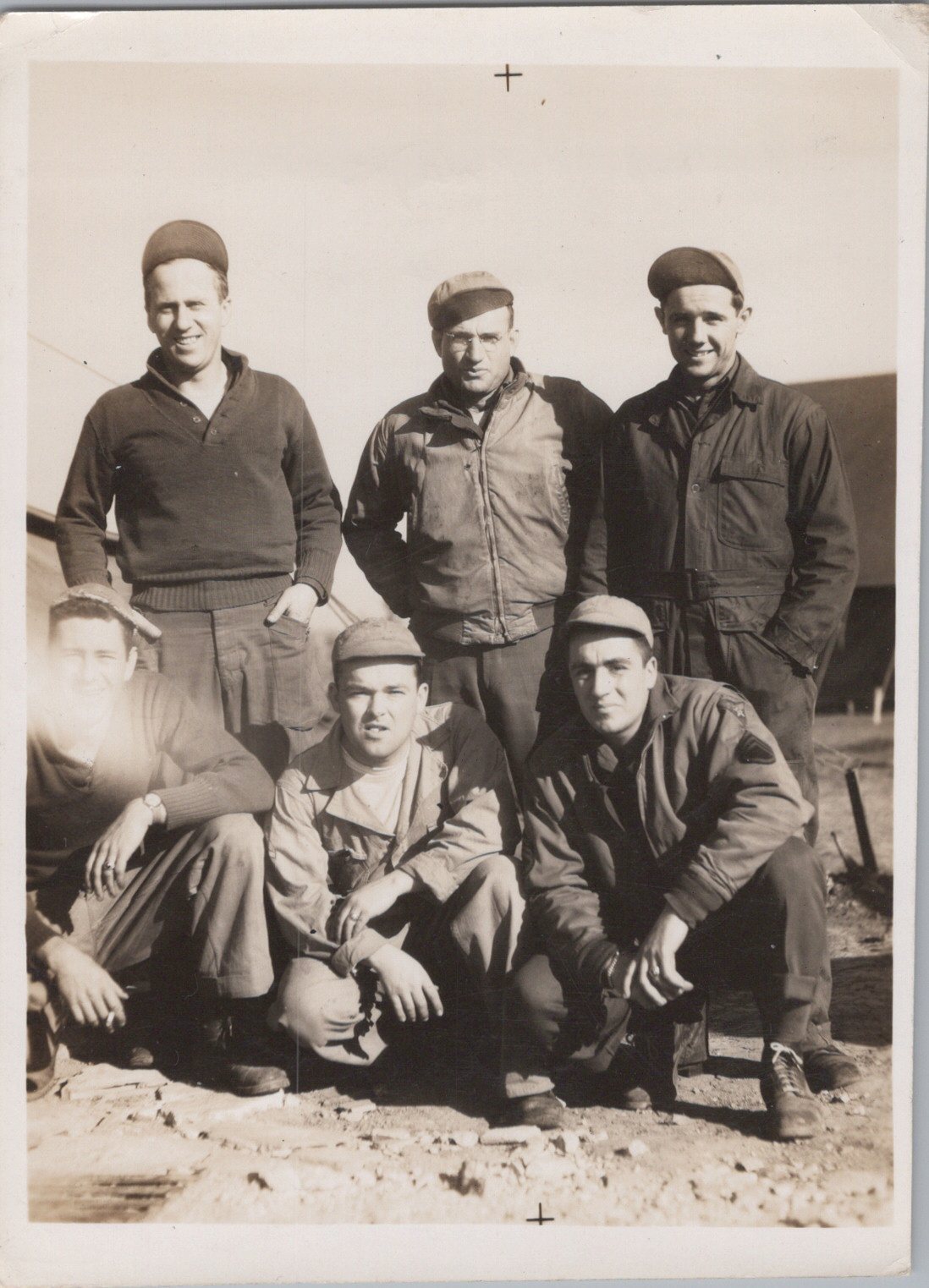
Kneeling: ???; David Coldren; Myron Musser.
Tues., May 11, 1943—Eddie Rickenbacker flew in and talked to us this evening. Very interesting.
| Donald J. Tolle, 1988: Apparently Eddie Rickenbacker (the World War I ace) was flown in for the purpose of conveying to us the fact that our “tour abroad” would be extended beyond the six months we had been told it would probably last. (And it was extended to nearly six times six months.) At any rate, he did a pretty good job of making his case by telling us how much better we had it than the ones slugging it out in the Pacific. He himself and some others had just recently had the experience of crash-landing in a B-17 in the Pacific Ocean and spending 22 days on life rafts before they were rescued. And he told of the bird (sea swallow) which landed on his head when they were starving and thus provided them with some food and the bait to catch fish so they could survive. In the face of such stories, the men of the 47th could not gracefully complain about being kept overseas longer than originally expected; so Rickenbacker’s mission paid off (and we “paid” with another two years overseas!). |
Wed., May 12, 1943—Group stood down today. African campaign over today except for mopping up some scattered troops. Lovely letter from Mary Alice.
Thurs., May 13, 1943—The African Campaign is ended. Thousands of prisoners have been going by all day. One truck broke down loaded with Italian officers. I stopped and gave the Italians the once over. They don’t seem sad about being captured. One British boy not even wearing a gun was their guard. One Brig. Gen. was in the truck.
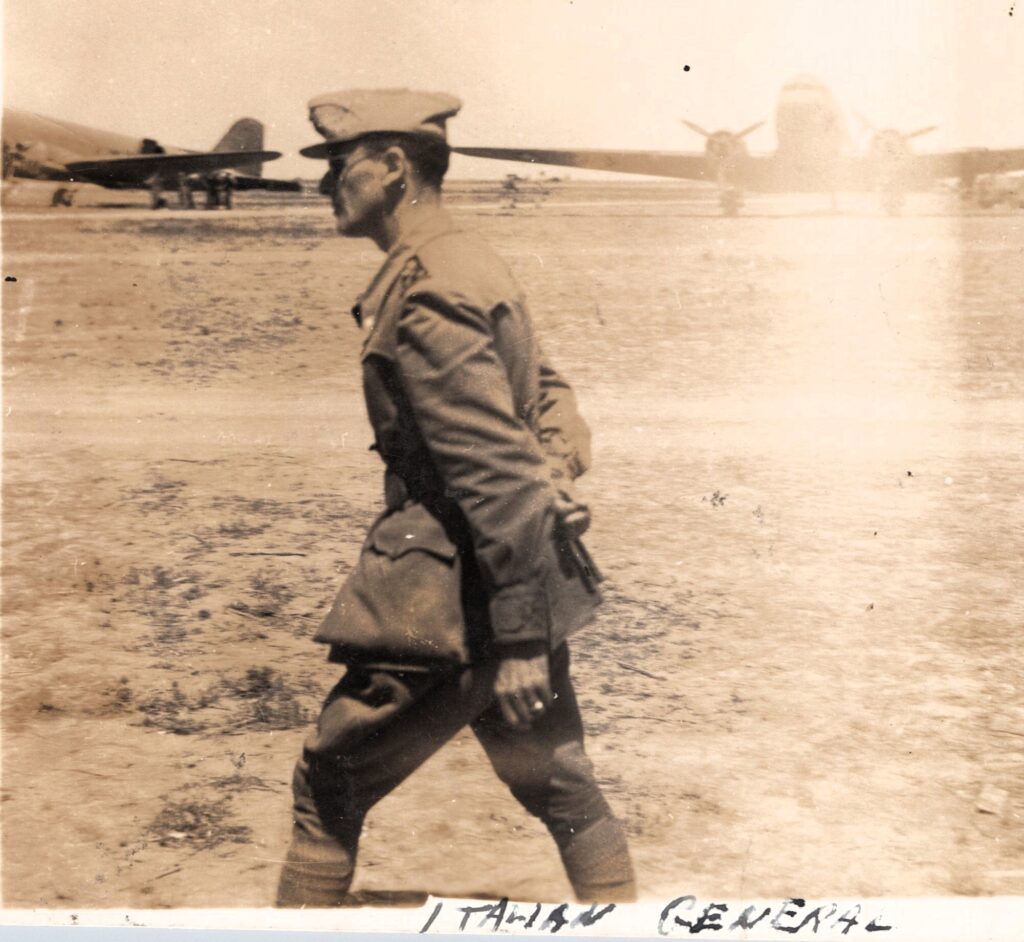
Fri., May 14, 1943—Went to Tunis in command car. Saw thousands of prisoners on the way, dozens of destroyed American light tanks. At Tunis airport there were dozens of destroyed Nazi planes.
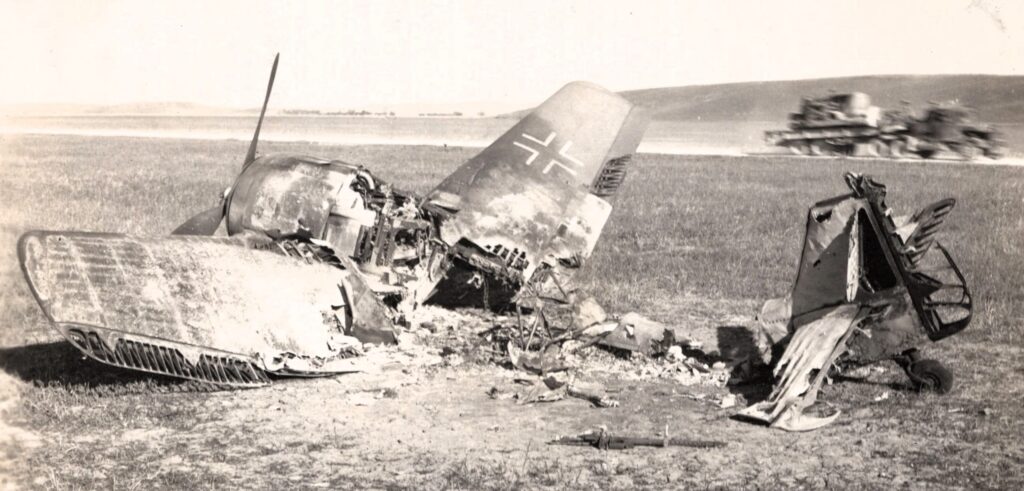
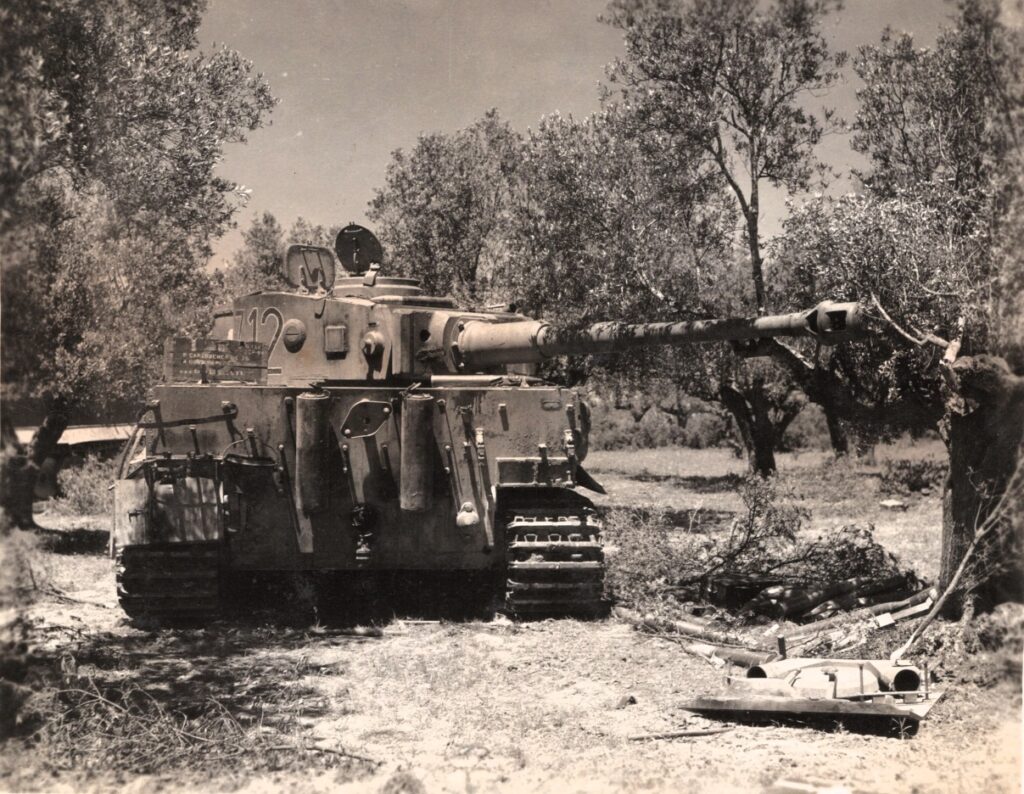
Sat., May 15, 1943—Got stranded in Tunis; spent night in Hotel Nacional last night. Met Junior on street this morning. He was stranded too. We spent night at same hotel tonight.
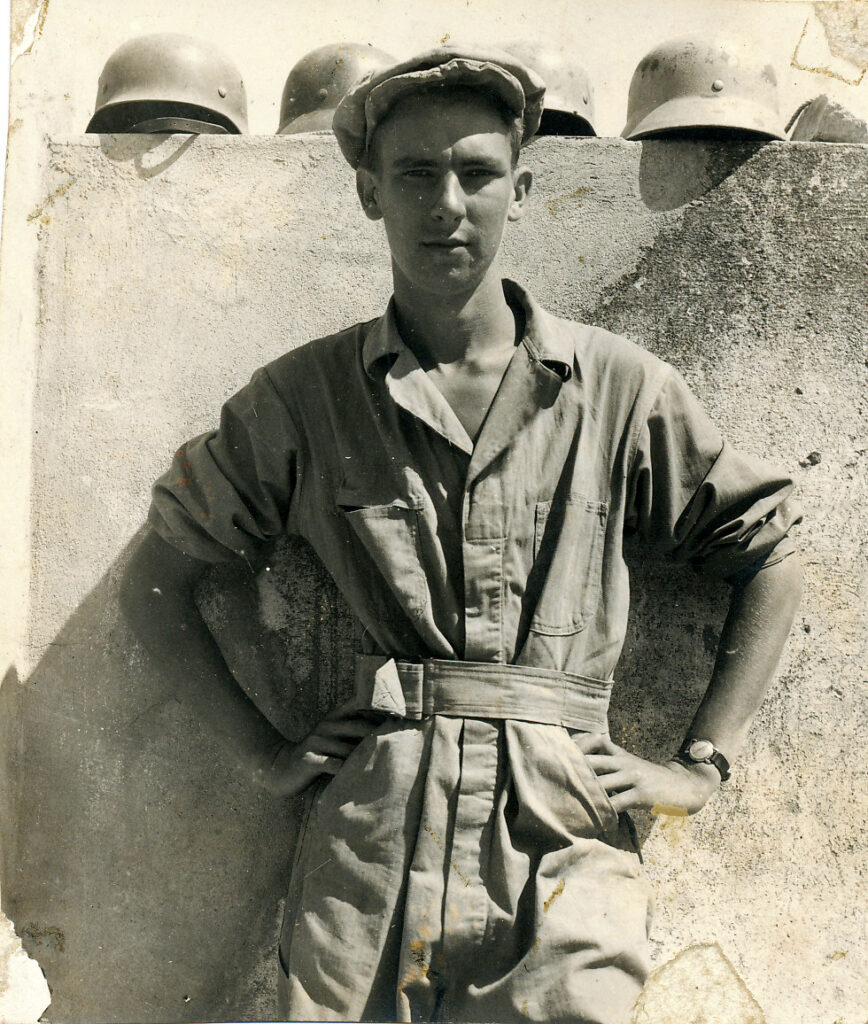
Sun., May 16, 1943—No amusement in Tunis at all. No water or light in hotel. We finally got a ride back to camp with an Ordnance capt. in a command car.
| TUNIS Souk el Arba, Tunisia May 14-16, 1943 On Friday, May 14, 1943, one of our pilots asked if I wanted to go to Tunis with him, as he was taking his gunners for a day off to see the sights and had room for three other people. Naturally I wanted to go. So the six of us started early in the morning in a command car. Approaching Beja, a small town a few miles from Souk el Arba, from the top of a hill going down into a valley we saw one of the loveliest sights of the whole trip. Of course, the closer we got the less different it seemed from any other African town, but from the distance it presented a picturesque setting which might have been a scene from a Fitzpatrick Traveltalk. “Round-boy” Adams, one of the best-liked boys in the Squadron, is buried in the American Cemetery at Beja. As we went through the innocent-looking village of Massicault, I thought of Capt. Willard who had a particular dislike for the place because of the heavy flak the Germans put into the air from there. That was where Capt. Gualtiere’s plane was hit so badly that he had to crash-land near Le Kef, killing the British photographer riding in the rear with the RCAF gunner. The only man who wasn’t wounded on that trip was the British bombardier-navigator riding in the most vulnerable spot on the plane—the glass nose. The road on in to Tunis gave plentiful evidence of the terrific battles that had raged around the different hills the Germans had attempted to hold only a few days before. In fact, from the Medjez el Bab area on to Tunis, wrecked vehicles—German, Italian, British, and American—tanks (mostly American light tanks—10 or 15 tons) blasted to bits by artillery and by the 60-ton Mark VI of the Germans, tremendous piles of expended ammunition boxes and cans, bomb craters and shellholes—all of these mutely told a story of death. Hospital tents covering acres of land showed where the fortunate—and unfortunate—living lay. Silent, wooden crosses, some with the black cross of Germany, some painted white, some of bare, unpainted wood, told the story of those who had died for their ideals—or the lack of them. Row upon row of these quiet symbols of death forced their message upon all passers-by. Farther on, barbed wire entanglements surrounded the thousands of captured Germans and Italians. Few guards were in evidence, but escape was not what these men wanted. Most of them—Italians and Germans—were glad they were through with fighting and that now they would be comparatively well fed and safe till the war is over. All of the villages along the way showed destroyed or at least pockmarked buildings on all sides, giving evidence of the brutal power of our bombs. Bridges were often blown up; and hastily-built, temporary drive-ways over them have to serve till they can be more permanently replaced. As soon as we reached Tunis and drove around to locate the center of town, we went on out to the airdrome (El Aouina) a few miles from the city proper. There we saw dozens of German and Italian planes destroyed by our bombs a few days before. The Nazi swastika looked rather forlorn on the dragging tails of planes that would never carry them again. Hundreds of postcards and letters which had never reached their intended Italian recipients were blowing about the landing ground, giving another of the many pathetic sides of war. I picked up some of these letters as souvenirs, but I felt rather guilty doing it. Back in town, we separated to wander about as we pleased till about four o’clock, when we met again where the command car was parked. There I was informed that the others, except one, had plans to be in Mateur for the night; so the choice for the other two of us was to either stay in Tunis or—stay in Tunis. We stayed in Tunis. The Hotel Nacional on the Rue de Holland was the only place we could find rooms for the night, and we each got a room (50 francs each), because the other guy intended to have a companion (female) for the night. Thinking of Mary Alice, I couldn’t talk myself into doing that (even in my delicate sexual condition); so I spent the night alone in a double bed with one blanket which was not air-tight. Did I say alone? Several assorted varieties of mosquitoes kept me from getting too lonesome. (Incidentally, there were no lights, no water, and no food available at this hostelry which was managed (?) by a native in a sport coat and draped trousers.) In the morning, my hotel-mate (who never had lured a woman into his room) and I went to the Twelfth Air Force Base and got a piece of bread and butter and a cup of synthetic coffee which served as breakfast. Then we roamed the streets until time to meet the others at 11:00 a.m. In our wanderings we saw some American nurses dressed in coveralls; so I went up to two of them and asked them to please speak to me in English. They did; and I was very much pleased to hear both of them speak with a good Georgia accent. We showed them where they could buy some postcards of Tunis, and then we parted because they had to catch their truck back to Mateur. After haunting our agreed-upon meeting place for several hours, we decided that our transportation had forsaken us. By this time I was beginning to have visions of a sudden and complete reduction in rank upon my return to camp, and my feelings for one 97th pilot were far from kindly. I had no desire whatsoever to start hitch-hiking back and get stranded in the middle of nowhere at night. So . . . we arranged for another night at the Hotel Nacional. I met Junior on the street, and he, too, was lost (with Webber) from his mode of transportation (Hypo Joe, the Photo jeep). So we all got rooms at the Hotel Nacional. Then we began wandering in earnest about the streets of Tunis. Coming upon a particularly infeasible-looking section of the city, we started down one of the narrow, winding, ill-smelling alley-ways to see what sort of condition the people lived in. Just as we started in, we met two British soldiers staggering out, evidently in somewhat of a drunken condition. One of them asked us what day it was, and when we told him, he said, “My God! It took us four days to find our way out of there!” We went on with slightly less-eager feet. Filth and stench and a mass of winding alleys met us on every hand; and as dusk began to settle upon us, we began our return trip back through the throngs of dirty but pretty little French, Italian, Arab, and mongrel children who clung to us with cries of “Bonbon! Bonbon! American camarade!.” Having already given away all of our gum and candy, we could only answer, “Fini; fini.” And so into fresh air and light again. While we were resting on cathedral steps, a British soldier came up and sold Junior an Italian automatic for 1000 francs, thereby making a neat profit of 1000 francs. But it will make a nice souvenir for after the war—even for $20. As we rounded a corner near our hotel, an old, distinguished-looking, well-dressed French gentleman saluted us, shook our respective hands and asked for a cigarette. He was given three or four, and he went into raptures—finally taking his leave with another handshake, a kiss on the left cheek of each of us, and a final salute. We spent the night, arose, ate (?), and departed—all saying, “I’m glad I saw Tunis, but I’m coming back no more.” We got a ride up to our very tents in a command car driven by an Ordnance T/Sgt. and a Captain, who were on their way back to Algiers. Tunie, fini. |
Mon., May 17, 1943—I expected to be busted, but nobody seemed to miss me except Collins.
Tues., May 18, 1943—Jr., Mac, and I did a little harmonizing this morning on Mac’s “The Girls Back Home” which Jr. arranged this morning.
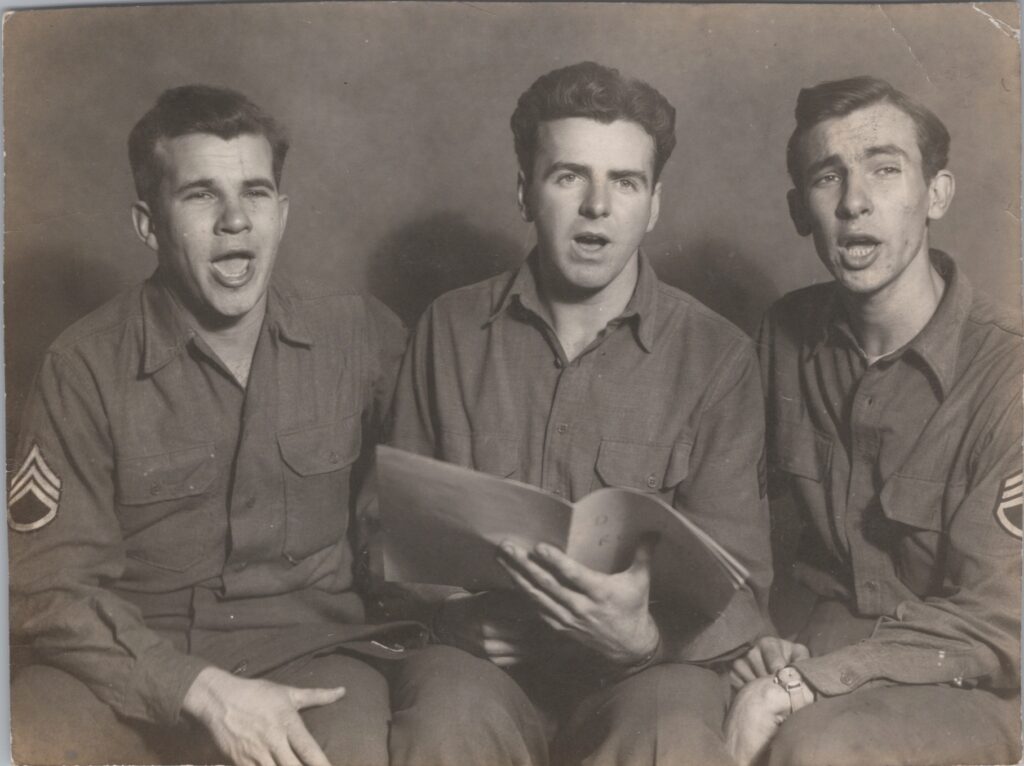
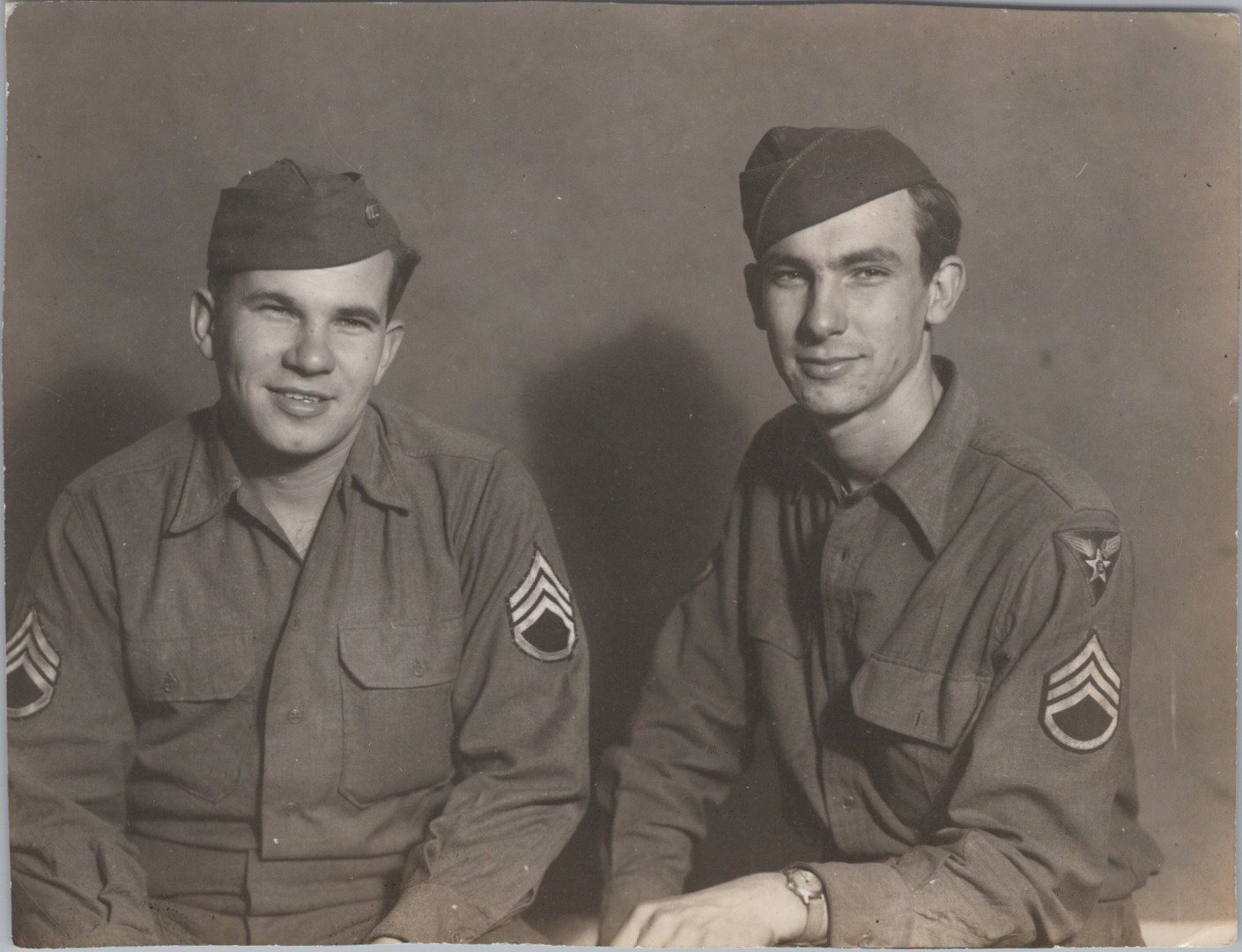
| Also in the room that day: Bill Boizelle (light blue shirt), Mary Alice Tolle (Donald’s wife, dark blue blouse), Kay Tolle (Junior’s wife, not shown), and (recording the video) Dave Tolle. Mary Alice liked a lot of Mac’s songs, but she never really liked this one, considering it to be disparaging of the girls back home. The Girls Back Home Poor little sheep, to see how they weep, The girls back home; Worrying for, they’ve gone off to war, The boys from home. Sweet, sweet girls who give aesthetical’ly For the cause what they can, To blow up Japan, Japan. Playing at bridge and hating their lives, The girls back home; Wondering if they’ll ever be wives, The girls back home. Do you suppose it’s crying for their silk hose Makes their noses red? . . . Sending them off early to bed, The girls back home. —DMT |
Wed., May 19, 1943—Went to Constantine [Algeria] today; long truck ride [about 185 miles] over mountains all the way. Lovely country. Eight-hour ride.
Thurs., May 20, 1943—Staying at Air Force Transient “flophouse”. Lovely ladies to look at here in Constantine but nothing to do but go to movies at Red Cross.
Fri., May 21, 1943—Walked across suspension bridge—2nd largest in world. Quite a gorge for a bridge to span.
Sat., May 22, 1943—Left at noon to go back to Souk el Arba. Arrived at 9:00 p.m.
Sun., May 23, 1943—Caught up on some back work. Didn’t realize it was Sunday till this evening.
Mon., May 24, 1943—Several letters from home today.
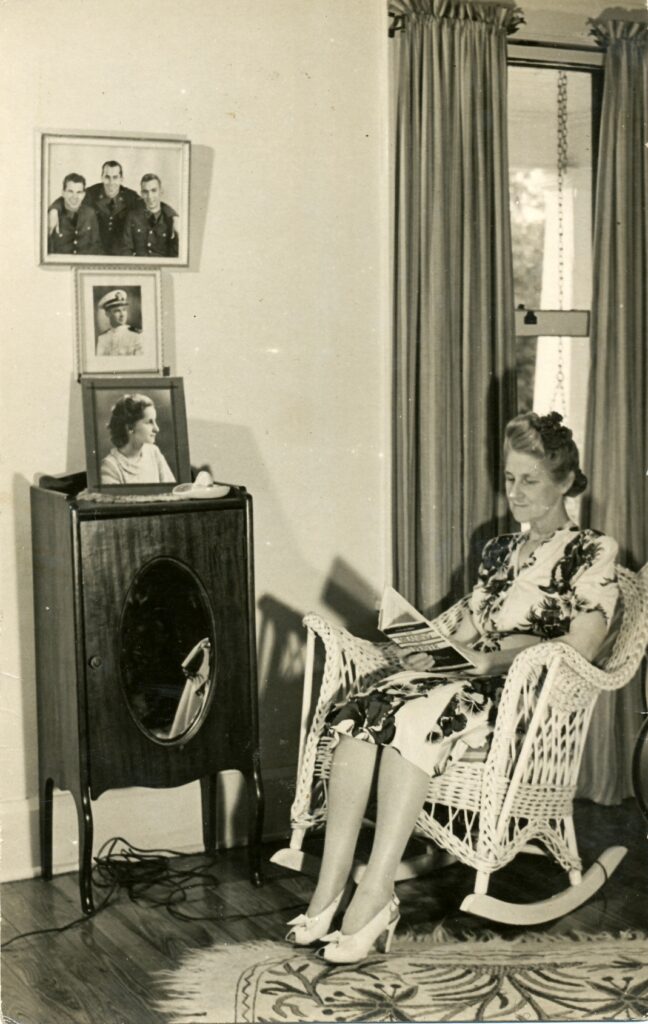
Wed., May 26, 1943—Dust storms & flies.
Tues., May 25, 1943—Will almost be glad when we get back to combat duty. This quiet is getting me down.
Thurs., May 27, 1943—More dust. Flies and bugs are getting bad. Puked this afternoon.
Fri., May 28, 1943—Chills on guard last night. “G.I.’s” (dysentery) today. Weakest I’ve ever been. Missed four straight meals.
Sat., May 29, 1943—Birthday today. Feel much better today.
Sun., May 30, 1943—Group moving by bits to Soliman. Dusty and hot.
Mon., May 31, 1943—Very hot today. Took bath in my “tub.” Moving tomorrow.